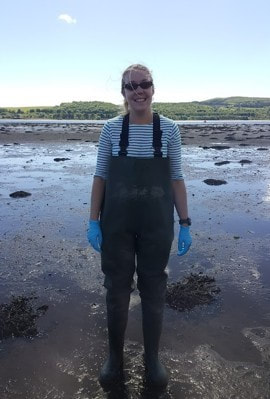Dr Kiri Rodgers
ECG Bulletin January 2024
Kiri completed her PhD degree in environmental geochemistry at the University of the West of Scotland in 2017. Since then, Kiri has been a postdoc, R&D tax specialist, research fellow, and now a lecturer in environmental science. Her research started with steel waste characterisation and remediation, and now she focuses on environmental antimicrobial resistance.
What inspired you to become a scientist?
I wanted a job that challenged me and was never boring. Growing up, I was obsessed with CSI, the excitement of different crimes and amazing science that answered all their questions! This led to analytical chemistry at the University of Plymouth
What inspired you to become a scientist?
I wanted a job that challenged me and was never boring. Growing up, I was obsessed with CSI, the excitement of different crimes and amazing science that answered all their questions! This led to analytical chemistry at the University of Plymouth
|
How did you come to specialise in environmental geochemistry?
During my undergraduate degree, we were exposed to a wealth of different applications and research. I was lucky, and worked with Dr Miranda Keith-Roach, looking at the immobilisation and/or remediation of environmental radionuclides. This project highlighted the importance of caring for the environment, but also fixing the damage we have already caused. That was it, I was hooked! I graduated around the time of the Fukushima nuclear disaster, and that solidified my interest in tackling environmental problems. I worked for the environment protection agency (EPA), but then a PhD on mitigating environmental impacts of steel waste pollution came up. This study opened my eyes to industry, as well as environmental and scientific techniques that could be used to tackle environmental questions. This led to geochemistry postdocs tackling antimicrobial resistance, making me an interdisciplinary scientist, and letting me travel and explore the world |
Could you describe your current job?
I am now the programme leader of a brand-new Applied Environment Science and Sustainability course at the University of the West of Scotland. This role allows me to teach the next generation key environmental science concepts to tackle global threats. My research includes antimicrobial resistance and impacts of climate change.
What advice would you give to anyone considering a career in environmental chemistry?
Follow what interests you! Environmental chemistry is the basis of a broad range of career options and disciplines, whether you want to work in the field, lab, office, industry or politics. Also explore different areas; I have worked for the EPA in both industrial and research laboratories, and for a corporate company. Some positions seemed like a step back, but every role contributed to the researcher and academic I am today.
What are some of the challenges facing the environmental chemistry community?
Action! It is easy to talk about problems and solutions, but implementing change is the real challenge. We as scientists need to focus our efforts on networking with people who can implement change.
What is the most rewarding aspect of your career so far?
There are two contrasting moments in my career to date:
1. Since finding my niche area of research, “role of the environment on the prevalence of antimicrobial resistance”, I have worked with stakeholders to influence policy in India. This is working progress, but it’s great to see research influencing change.
2. At a science festival, I witnessed primary school children educating their parents on recycling and not using glitter. The next generation leading the way for environmental change!
If you weren’t a scientist, what would you do?
I can’t imagine myself in any other role; however, I believe I would be working in politics to implement change.
And what do you do when you are not working?
Going on hill walks with my precious puppy, Lola. My dog is my world!
I am now the programme leader of a brand-new Applied Environment Science and Sustainability course at the University of the West of Scotland. This role allows me to teach the next generation key environmental science concepts to tackle global threats. My research includes antimicrobial resistance and impacts of climate change.
What advice would you give to anyone considering a career in environmental chemistry?
Follow what interests you! Environmental chemistry is the basis of a broad range of career options and disciplines, whether you want to work in the field, lab, office, industry or politics. Also explore different areas; I have worked for the EPA in both industrial and research laboratories, and for a corporate company. Some positions seemed like a step back, but every role contributed to the researcher and academic I am today.
What are some of the challenges facing the environmental chemistry community?
Action! It is easy to talk about problems and solutions, but implementing change is the real challenge. We as scientists need to focus our efforts on networking with people who can implement change.
What is the most rewarding aspect of your career so far?
There are two contrasting moments in my career to date:
1. Since finding my niche area of research, “role of the environment on the prevalence of antimicrobial resistance”, I have worked with stakeholders to influence policy in India. This is working progress, but it’s great to see research influencing change.
2. At a science festival, I witnessed primary school children educating their parents on recycling and not using glitter. The next generation leading the way for environmental change!
If you weren’t a scientist, what would you do?
I can’t imagine myself in any other role; however, I believe I would be working in politics to implement change.
And what do you do when you are not working?
Going on hill walks with my precious puppy, Lola. My dog is my world!


